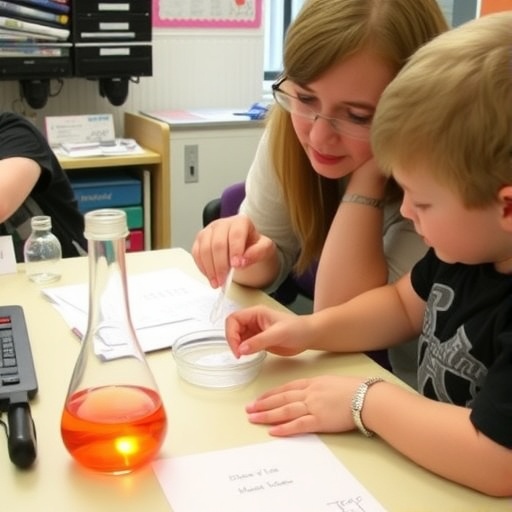In the evolving landscape of education, the passion and commitment of teachers often drive the success of the curriculum. A new study sheds light on the perceptions of primary school teachers in the Republic of Ireland regarding the patrons’ curriculum, a framework that aims to guide religious education. Conducted by researchers A. Mullally and P. Kieran, this investigation reveals the intricate relationship between teacher autonomy, religious values, and the challenges they face in a diverse educational setting.
The patrons’ curriculum has been a topic of discussion among educators, parents, and policymakers alike. The curriculum is influenced by various denominations, and teachers are expected to navigate its complexities while addressing the needs of their students. This study explores how teachers perceive their roles within this framework and how they adapt their teaching practices based on their convictions and the expectations set forth by the patrons.
A key finding of the research highlights the overwhelming sense of challenge that teachers report in implementing the patrons’ curriculum. Many educators express concerns about balancing the requirements of the curriculum with the individual needs of their students. With increasing cultural diversity among the student population, teachers acknowledge the importance of fostering an inclusive environment while adhering to the curriculum guidelines. The struggle to meet these two demands creates a significant tension in their teaching practices.
Moreover, the study reveals that teachers feel a strong sense of conviction regarding their educational responsibilities. Educators are often driven by a personal commitment to their teaching roles that transcends mere compliance with the patrons’ expectations. This conviction motivates them to seek creative ways to engage their students with the curriculum, often finding innovative pedagogical strategies that resonate with diverse learner backgrounds. Teachers frequently advocate for a curriculum that not only imparts religious education but also promotes critical thinking and personal reflection among students.
Teachers in this study reported that they employ a range of pedagogical strategies to create a more engaging learning environment. This includes integrating storytelling, experiential learning, and interactive discussions that encourage students to explore religious concepts from various perspectives. By leveraging their creativity, educators are able to make the curriculum more relevant to their students’ lives, despite the constraints imposed by the patrons’ curriculum.
While the research presents a largely positive view of teacher initiative and conviction, it also underscores the systemic issues that contribute to the difficulties faced in the classroom. Many teachers voiced frustration over a lack of training and resources specific to delivering the patrons’ curriculum effectively. Without adequate professional development opportunities, educators often find themselves inadequately equipped to address the challenges posed by an increasingly diverse classroom dynamic.
The study’s findings suggest a pressing need for policymakers and educational leaders to prioritize support mechanisms for teachers. This involves not only offering specialized training programs related to religious education but also fostering collaboration among educators to share best practices and resources. Engaging teachers in the curriculum development process could lead to more practical solutions and enhance teacher morale, ultimately benefiting student outcomes.
Teacher experiences illustrated in the study also highlight the emotional weight that accompanies their responsibilities. Many educators expressed feelings of isolation in their struggles to reconcile personal beliefs with curriculum requirements. This emotional burden can hinder their ability to perform effectively, emphasizing the importance of a supportive school culture. When teachers feel supported by their administration and colleagues, they are more likely to thrive in their roles, leading to a more positive educational experience for students.
Furthermore, the research uncovers the role of parental expectations and involvement in the educational process. Parents often have strong convictions regarding religious education and how it should be imparted to their children. This backdrop can complicate the teaching landscape, with educators needing to balance school policies with parental aspirations. The dynamics of this relationship can either enhance or undermine the effectiveness of teaching, depending on how well it is managed.
As educators navigate these multifaceted challenges, the study emphasizes the necessity for continuous dialogue between all stakeholders in the education community. Policymakers, school administrators, teachers, and parents must work collaboratively to create an environment that allows for flexibility within the patrons’ curriculum while ensuring that the educational needs of all students are met. Open lines of communication can lead to innovative solutions that respect the diverse backgrounds of students while adhering to curriculum standards.
The insights from Mullally and Kieran’s study resonate beyond the confines of the Republic of Ireland, reflecting challenges faced in various educational systems worldwide. As globalization continues to influence cultural dynamics, the need for inclusive and adaptable curricula has never been more critical. This research raises awareness of the central role teachers play in shaping the educational experience and highlights the necessity of providing them with the tools and support they need to fulfill that role effectively.
In conclusion, as educators grapple with the demands of the patrons’ curriculum and their commitment to student engagement, the findings of this study advocate for a comprehensive reevaluation of support mechanisms. As stakeholders come together to address these pressing challenges, it is essential to champion the voices of teachers, recognizing their invaluable contributions to nurturing thoughtful, reflective, and inclusive learning environments for all students.
Subject of Research: Teachers’ Perspectives on the Patrons’ Curriculum in Primary Schools in the Republic of Ireland
Article Title: Choice, challenge and conviction: teacher perspectives on teaching the patrons’ curriculum in primary schools in the Republic of Ireland.
Article References:
Mullally, A., Kieran, P. Choice, challenge and conviction: teacher perspectives on teaching the patrons’ curriculum in primary schools in the Republic of Ireland.
j. relig. educ. (2025). https://doi.org/10.1007/s40839-025-00273-4
Image Credits: AI Generated
DOI: https://doi.org/10.1007/s40839-025-00273-4
Keywords: Educational challenges, teacher autonomy, religious education, patrons’ curriculum, primary schooling, Ireland, inclusive teaching, curriculum development, teacher support, educator perspectives.




